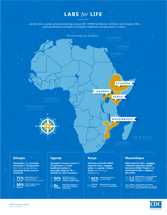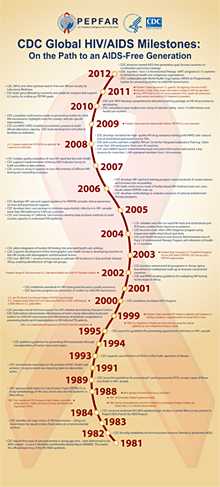CDC Global HIV/AIDS Milestones: On the Path to an AIDS-Free Generation
"While the finish line is not yet in sight, we know we can get there, because now we know the route we need to take." Secretary of State Hillary Clinton
(watch video)
"The science is clear, and though the road ahead will not be easy, the opportunity before us is extraordinary." AMB Eric Goosby, U.S. Global AIDS Coordinator
(read blog post)
"Few could have imagined that we’d be talking about the real possibility of an AIDS-free generation... And we arrived here because of all of you and your unwavering belief that we can -- and we will -- beat this disease." President Obama, World AIDS Day 2011
(watch video)
2012
- CDC advances toward AIDS-free generation goal, focuses countries on combination prevention strategy.
- CDC transfers Track 1.0 Antiretroviral Therapy (ART) programs in 13 countries to Ministries of Health and indigenous organizations.
- CDC collaborates with WHO on Programmatic Update for preventing mother-to-child HIV transmission.
2011
- CDC, WHO, and other partners launch first-ever African Society for Laboratory Medicine.
- CDC leads groundbreaking economic and epidemic analyses that support U.S. policy for scaling up PEPFAR goals.
- President Obama announces accelerated U.S. goals for “the beginning of the end of AIDS.”
- Secretary of State Clinton issues call-to-action to create an AIDS-free generation.
- Study (HPTN 052) by U.S. NIH shows treatment of HIV+ people with antiretroviral drugs reduces transmission of HIV (treatment is prevention).
2010
- CDC and WHO develop comprehensive laboratory training package on HIV drug resistance genotyping.
- CDC completes 6-year multicountry study of injection safety, trains 115,000 trainers and health care workers.
2009
- CDC completes multicountry study on preventing mother-to-child HIV transmission; highlights need for country- and site-specific interventions.
- CDC and WHO-AFRO establish accreditation process to build African laboratory capacity. CDC leads development of toolkit to facilitate accreditation.
- President Obama launches Global Health Initiative; PEPFAR is a core component.
2008
- CDC develops standards for high- quality HIV drug-resistance testing (with WHO) and reduces cost of dried blood spot-based test by 50%.
- CDC and country partners establish African Centre for Integrated Laboratory Training; trains more than 300 participants from over 20 countries.
- CDC and UNAIDS launch Global Monitoring & Evaluation Information web portal, a key resource for more than 1,200 registered members from 124 countries.
- U.S. Congress reauthorizes PEPFAR for an additional 5 years at up to $48 billion.
2007
- CDC initiates quality evaluation of new HIV rapid test kits with USAID.
- CDC supports implementation of Kenya AIDS Indicator Survey to build surveillance data systems .
- CDC conducts study in Uganda on cost effectiveness of different HIV testing and counseling strategies.
2006
- CDC develops HIV rapid test training program, trains hundreds of master trainers and increases test accessibility.
- CDC leads multicountry study of facility-based HIV treatment and care costs; results inform PEPFAR scale-up.
- CDC develops methodology to evaluate outcomes of national antiretroviral therapy programs.
2005
- CDC develops HIV care and support guidance for PEPFAR, includes clinical preventive services and psychosocial support.
- CDC develops basic care package to minimize opportunistic infections in HIV+ people; more than 500 delivered to 9 African countries.
- CDC and University of California, San Francisco develop data synthesis methods to build country capacity to understand HIV epidemic.
2004
- CDC validates and rolls-out rapid HIV tests and dried blood spot PCR tests, enables faster response to epidemic.
- CDC launches Early Infant (HIV) Diagnosis program using inexpensive dried blood spot tests that are stable in harsh conditions.
- CDC and Health Resources and Services Administration launch Track 1.0 Antiretroviral Treatment Program with Ministries of Health in 13 countries.
2003
- CDC pilots integration of routine HIV testing into antenatal health care settings.
- CDC supports development of first Demographic and health Survey in developing countries to link HIV results with demographic and behavioral factors.
- CDC uses BED HIV-1 enzyme immunoassay to estimate HIV incidence in Asia and Sub-Saharan Africa, enabling identification of high risk groups.
- President Bush announces U.S. President’s Emergency Plan for AIDS Relief (PEPFAR); CDC has key role in PEPFAR implementation.
2002
- CDC launches antiretroviral drug regimen in Kenya, laying foundation for widespread scale-up in resource-constrained countries.
- CDC and WHO develop guidelines for evaluating HIV testing technologies in Africa.
- President George W. Bush announces U.S. International Mother and Child HIV Prevention Initiative.
2001
- CDC establishes standards for HIV testing and laboratory quality assurance.
- CDC launches programs on prevention of mother-to-child HIV transmission.
2000
- CDC establishes its Global AIDS Program.
- U.S. and UN Security Councils each declare HIV/AIDS a security threat.
- U.S. Congress enacts Global AIDS and Tuberculosis Relief Act of 2000, authorizing up to $600 million for U.S. global efforts.
1999
- CDC provides critical technical support for LIFE initiative launched by President Clinton.
- CDC field stations demonstrate effectiveness of short-course zidovudine to prevent mother-to-child HIV transmission and effectiveness of antibiotic prophylaxis in preventing deaths and hospitalizations in HIV-infected TB patients.
- President Clinton launches LIFE Initiative (Leadership and Investment in Fighting an Epidemic) expanding efforts to combat AIDS in Africa.
1998
- U.S. Department of Health and Human Services issues first national guidelines for use of antiretroviral therapy in adults. (read updated guidelines)
1996
- Joint United Nations Programme on HIV/AIDS (UNAIDS) established.
1995
- CDC issues first guidelines for preventing opportunistic infections in HIV+ people.
1994
- CDC publishes guidelines for preventing HIV transmission through transplantation of human tissue and organs.
1993
- CDC expands case definition of AIDS to reflect fuller spectrum of disease.
1991
- CDC recommends restrictions on the practice of HIV+ health care workers; Congress enacts law requiring states to take similar action.
1989
- CDC issues first guidelines for preventing P.carinii pneumonia (PCP), a major cause of illness and death in HIV+ people.
1988
- CDC sponsors field station in Cote d’Ivoire, Project RETRO-CI, to study epidemiology of HIV virus and to describe HIV epidemic in West Africa.
- WHO declares first World AIDS Day on December 1.
1987
- WHO launches Global Programme on AIDS.
1985
- First International AIDS Conference held in Atlanta, a joint effort of Department of Health and Human Services and World Health Organization (WHO).
1984
- CDC conducts landmark HIV/AIDS epidemiologic studies in central Africa as key partner in Project SIDA (French for AIDS Project).
- Human immunodeficiency virus (HIV) isolated by Luc Montagnier (Pasteur Institute) and Robert Gallo (U.S. National Cancer Institute).
1983
- CDC identifies all major routes of HIV transmission – ruling out transmission by casual contact, food, water, air, or environmental surfaces.
1982
- CDC formally establishes the term Acquired Immune Deficiency Syndrome (AIDS).
1981
- CDC reports first cases of rare pneumonia in young gay men – later determined to be AIDS-related – in June 5 Morbidity and Mortality Weekly Report (MMWR). This marks the official beginning of the HIV/AIDS epidemic.
Labs for Life Infographic:

Get email updates
To receive email updates about this page, enter your email address:
Contact Us:
- Centers for Disease Control and Prevention
1600 Clifton Rd
Atlanta, GA 30333 - 800-CDC-INFO
(800-232-4636)
TTY: (888) 232-6348
24 Hours/Every Day - Contact CDC-INFO
 ShareCompartir
ShareCompartir



